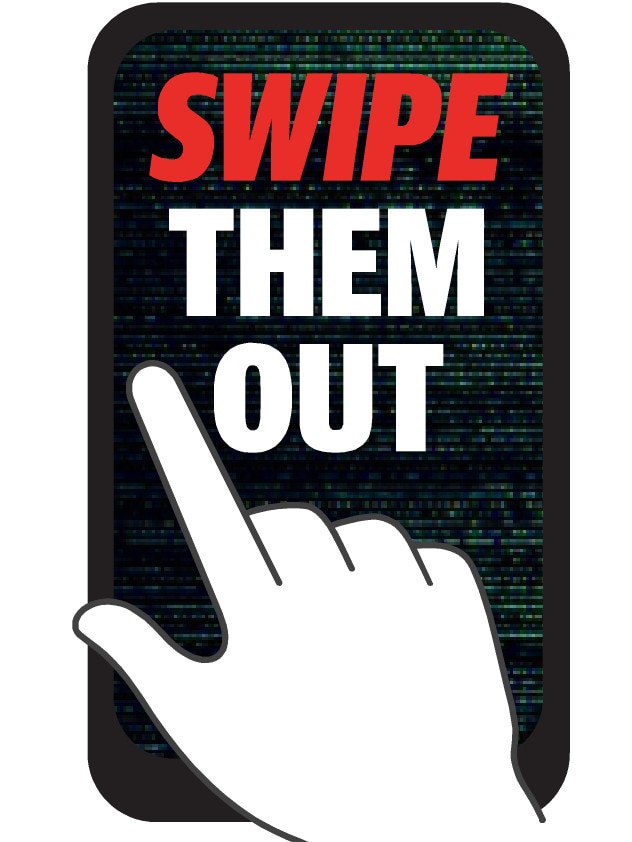Women turn to online groups to unmask creeps while laws leave them open to abuse
Women are increasingly turning to online groups to unmask dangerous men they encounter on dating apps — a desperate move that experts say is plugging gaps in the legal system.
Police & Courts
Don't miss out on the headlines from Police & Courts. Followed categories will be added to My News.
Women are turning to Facebook groups to warn others and seek help to escape dangerous men they meet online because dating apps consistently fail to tighten their security measures.
The Daily Telegraph found examples of women sharing pictures and details of men they have matched with on Facebook groups to warn others of catfishing and harassment.
In one example, a Sydney woman shared the profile of a man she matched with after she became suspicious that he was faking his identity.
The group then tracked down the man in the photos, who confirmed that his identity had been stolen by a creep on a dating app looking to lure more women.
“We have managed to find the guy in the pics and it turns out he’s from another state and some creep is stealing his photos! Be safe out there single gals,” the post said.
Popular dating apps do not currently require users to verify their identity, but some provide the option to do so.
In a second post, a woman revealed that she had been banned from a dating app after she reported that her former abusive partner — who is subject to an AVO — was on the platform.

“I’ve sent (an) explanation and offered to share copy of police reports, etc but heard nothing on (sic) over a week,” the post said.
In a third post, a woman sought advice from others about matching with a man on a dating app who would not stop repeatedly calling her and harassing her after she sought to end contact.
“It’s actually scaring the hell out of me and would it be an issue to call police about?
“What would you do?” the post asked.
News of women inventing their own safety precautions to navigate online dating comes a week after The Daily Telegraph launched its Swipe Them Out campaign — a call to rid dating apps of repeat, violent offenders.
It follows discussion around the alleged murder of Dannielle Finlay-Jones, with that matter yet to be determined by the courts.
In addition to growing reports spreading awareness in community groups, experts said women were also running private groups dedicated to sharing the details of violent men.
Crime Stoppers boss Peter Price said that although dating apps were run by international companies, Australian law could still be used to haul them into line.
“The apps have a duty of care and if you take an analogy from a different environment — let’s say I make a car and I have to sell that car — there are all these compliance things I need to adhere to.
“We are putting people directly in harm’s way without any level of protection by the app vendors,” Mr Price said.
“There is no criminal justice system, no protection, no safety measures (to deal with apps).”
Full Stop Australian clinical director Tara Hunter said women were turning to online warnings “in the absence of a formal system”. “It’s not ideal but understandable.”
ONLINE DATERS WANT OFFENDERS DELETED
The Daily Telegraph spoke with six women who all agreed known sexual predators should not be allowed on dating apps.
The Telegraph is campaigning for violent, repeat offenders to be removed from dating apps following a string of alleged assaults after app meetings.
Most of the women interviewed found it necessary to take precautions when using dating apps themselves.
Friends Natalie Allen and Alice Davey feel banning people from dating apps who have AVOs taken out against them or have been convicted of violent crimes would make dating safer.
“You don’t know who they are behind the photos they put up. They could be anyone,” Ms Allen said.
“They might not even be the same person in the photo.”
Abbie Novack also feels that people who have committed sexual misdemeanours should be banned but that we should be careful about banning anyone with a criminal conviction.
“For people who have committed non-violent crimes, it’s not fair for them not to find love,” she said.“Especially if they have done their time and changed their ways.”
Rosie Cattell suggested a red flag system could be a better way of keeping people safe online.
“Maybe they could introduce a system where anyone convicted of a crime has to put it on their profile,” she said.
“Mind you, I don’t know if I’d go on a date with someone knowing they were a convicted criminal.”
Many women took some precautions when meeting someone from a dating app for the first time.
Got a news tip? Email angira.bharadwaj@news.com.au




